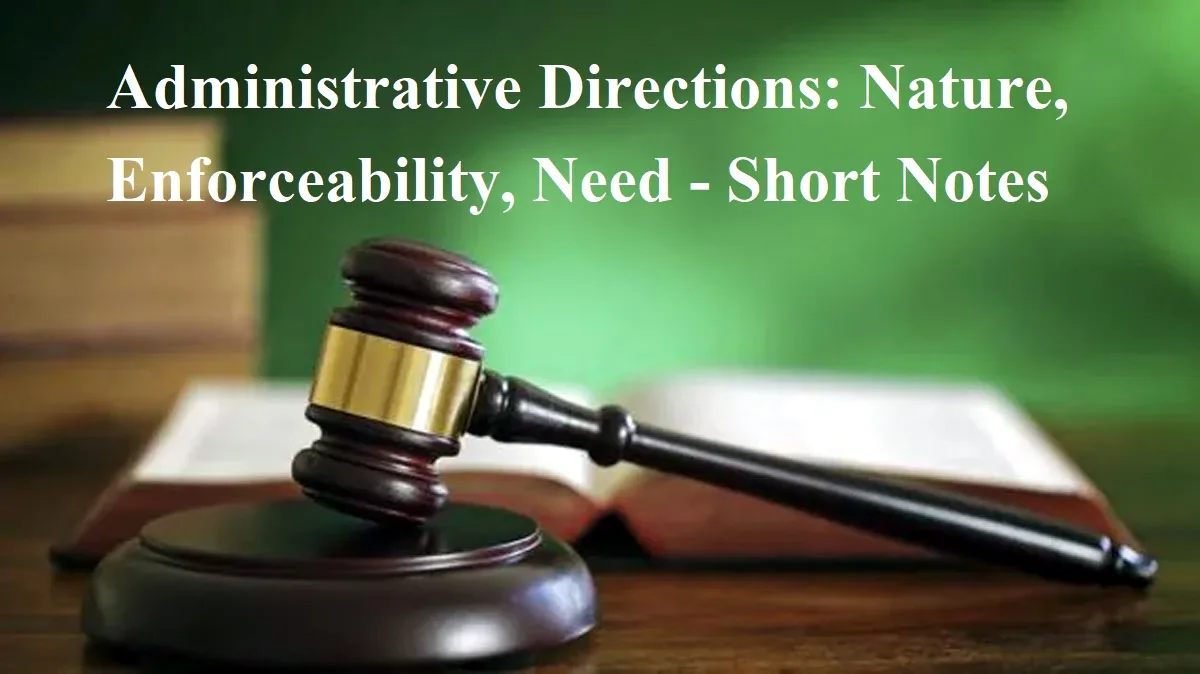In this article, we explore Administrative Directions: Nature, Enforceability, Need, case law, and the evolving legal landscape surrounding these instructions
Definition of Administrative Directions
Administrative directions represent instructions issued by higher authorities to their subordinates, guiding the exercise of discretionary powers within the executive realm. These directives are typically deployed in instances where essential rules are absent or to enhance existing regulations when statutory gaps are identified. Various forms of communication, such as letters, circulars, orders, memoranda, pamphlets, public notices, press releases, and government gazette notifications, serve as channels for disseminating administrative directions.
Origin and Legal Framework
The genesis of administrative directions can be traced back to Articles 73 and 162 of the constitution, which delineate the administrative powers of the Union and State governments, respectively. Article 73 delineates the executive power of the Union, while Article 162 deals with the executive power of the State. These provisions empower the government to issue directions, distinct from statutory powers.
Role and Importance
- The welfare state necessitates executive handling of people’s issues.
- Provides flexibility and agility in governance.
- Suitable for temporary or urgent situations.
Administrative directions play a pivotal role in a welfare state by facilitating responsive governance to address evolving societal needs. They enable swift adjustments to regulations, ensuring adaptability to changing circumstances. This flexibility is especially critical in addressing novel challenges where existing legal frameworks may be insufficient. Administrative directions provide a pragmatic approach to managing temporary exigencies, such as health crises or environmental emergencies, without necessitating formal legislative processes.
Enforceability and Legal Implications
- Generally considered a directory, not enforceable in court.
- Exceptions exist based on judicial interpretation.
- Non-compliance may result in disciplinary actions.
Administrative directions lack statutory backing and are generally considered directory rather than mandatory. While not legally binding, non-compliance may lead to disciplinary measures. The enforceability of administrative directions is subject to judicial interpretation, with courts exercising discretion based on individual cases. In instances where administrative directions align with statutory rules and have been adhered to consistently over time, courts may deem them enforceable. However, the legal landscape surrounding the enforceability of administrative directions remains ambiguous, with each case evaluated on its merits.
Case Law and Guidelines:
Fernandez vs. State of Mysore: PWD instructions are unenforceable but non-compliance may lead to disciplinary actions.
Raman and Raman vs. State of Madras: Administrative instructions, even under statutory powers, may not be legally binding.
Jagjit Singh vs. State of Punjab: Administrative instructions can be binding if in line with statutory rules.
Amitabh Srivastava vs. State of M.P: Administrative directions may modify statutory rules, allowing enforcement over rules.
Union of India vs. Charanjeet S. Gill: Administrative instructions without statutory authority lack legal force but can fill gaps in laws and regulations.
Conclusion
The current legal landscape regarding administrative directions is unclear and subject to judicial interpretation. Directions are generally non-enforceable but exceptions exist. Enforcement depends on compliance, duration, and conformity with statutory rules. The area of administrative directions remains open to judicial discretion and is evolving.
Read Also: Administrative Law Notes: JUDICIARY NOTES
What is Administrative Directions?
Administrative directions represent instructions issued by higher authorities to their subordinates, guiding the exercise of discretionary powers within the executive realm.
Need for Administrative Directions
Welfare state necessitates executive handling of people’s issues. Provides flexibility and agility in governance. Suitable for temporary or urgent situations.
Enforceability and Legal Implications of Administrative Directions
Administrative directions lack statutory backing and are generally considered directory rather than mandatory. While not legally binding, non-compliance may lead to disciplinary measures.



